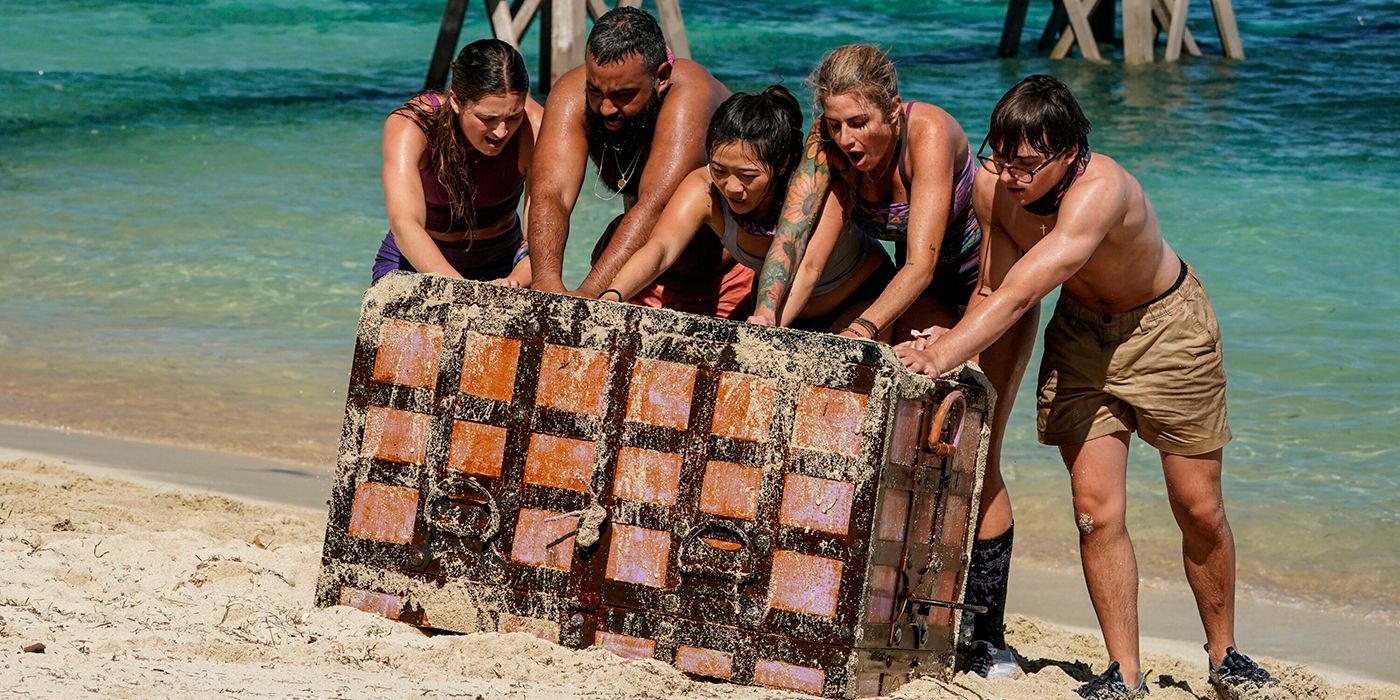There’s no shortage of long-running competitive shows out there, but after 43 seasons spanning the course of 20-plus years, Survivor has proven itself to be a staple of the reality TV genre. The success of the show attests to its ability to remain not just on the air, but also to adapt to different types of TV, especially during the rise of streaming services (Survivor recently made the top 10 shows on Netflix).
How does Survivor stay engaging to viewers old and new, even in rapidly changing times when it comes to how we view our TV? The secret to Survivor’s endurance over the years actually has many elements, which, as we’ll discuss, is fitting for the show.
'Survivor’s Main Premise Is Simple
The premise of Survivor is fairly simple and straightforward. A group of castaways all compete for a million-dollar prize by being marooned in an isolated location and having to fend for themselves, all the while taking part in physical challenges and scheming with (and against) each other to make it to the end. Every week, one member of the group is voted off the show, until only one remains.
With such a basic template for its competition (fend for yourself in the wild), Survivor is easily understood by the viewers, whether they have been watching since Season 1 or they’ve just joined the audience for the newest season. Even the Survivor slogan, “Outwit, outplay, outlast,” is short and sweet. Sometimes a new viewer can be hooked by the simplest of premises.
Even the more complicated aspects of the game, for example the challenges, have an easily understandable, basic goal: win the challenge, gain immunity from the vote. The rules of the game can be explained concisely using only one or two sentences. This ensures that the show itself is easily digestible, especially for viewers who just like to turn their minds off and watch something entertaining. After all, that’s what reality TV does best. But Survivor actually does more than that.
'Survivor' Combines Many Aspects of Reality TV
If you happen to be an audience member who loves to follow along with the contestant’s scheming and strategizing, however, Survivor gives you the ability to play along, in a way. The main premise may be simple, but Survivor is far from a one-trick pony.
Many other reality TV shows focus on one aspect of drama, especially if they strictly adhere to the rules of their genre. Dating shows focus mainly on the element of romance, while daytime game shows exist mainly for the spectacle. Jeopardy! primarily focuses on trivia, while The Amazing Race chronicles globe-trotting adventures.
Survivor’s use of reality TV aspects are complex in comparison. “Outplay, outwit, outlast” is a simple mantra, but it also indicates the multilayered formula that Survivor has excelled at over the years: outplay, for the physical competition; outwit, for the strategy and intelligence factors; and outlast, for endurance and the long-term luck and charisma needed not just to get to the end, but to survive that one last vote and win.
Survivor places heavy importance on being physically capable, but also capable of strategy. But both strength and strategy will fail you if you don’t have the social skills to build a solid alliance with competitors. All aspects of survival are needed to win, making Survivor unique in that it combines many entertaining aspects of reality TV into one show without becoming too muddled in the various themes.
'Survivor' Doesn’t Settle
Survivor incorporates as many engaging points of interest that reality TV can possibly have, using intelligence, strategy, physical adeptness, agility, social relationships, and (very basic) survival techniques. Only a well-rounded player will make it far, so adaptability is also important: you either learn fast, or your tribe will decide to cast you out.
Many other reality TV shows will focus on just one special element and remain in its genre, staying with a tried and true formula that others of its kind display as well (shows like Love Is Blind and Are You the One? stay within their bounds for good reason; why fix a formula that still draws in plenty of viewers?). Survivor gathers all of the engaging aspects of reality TV and combines them for maximum drama, intrigue, and enjoyment. Survivor may be set in its own formula now, after 40-plus seasons, but its ambitious structure makes it stand out even after so long.
'Survivor' Uses Iconic and Memorable Imagery
This may be one of the smallest factors in ensuring Survivor’s success, but plenty of the show’s gimmicks, objects, and jargon have also become iconic over the years. Things like the immunity idol, the tribe bandanas, and the immunity necklace all have a timeless feel to them, and the power attributed to these objects gives them great importance.
Long-time viewers find nostalgic comfort in the first challenge’s prize always being flint, feel that excited sense of accomplishment when the two tribes “merge,” and feel the rush of excitement when a contestant gets their hands on the elusive hidden immunity idol. And there’s nothing quite like seeing a confident contestant get blindsided by their own alliance. While not a mean-spirited game, Survivor can be harsh and dramatic at times. But that’s only part of the fun.
Even the host, Jeff Probst, is a familiar staple that factors into the show’s success. His tone hasn’t changed in the 23 years since his first appearance on Survivor in 2000. He acts as the castaways’ guide and mediator and is there for the whole journey and showing his excitement for the game by always giving enthusiastic commentary during challenges. Probst keeps the energy high, and Survivor would not be the same without him.
In addition to being familiar and iconic, Survivor combines as many tests as possible for its contestants, creating a competition that has endured for decades without losing its interest in the formula. Though the show has had its ups and downs, it never fails to deliver surprising twists and turns, interesting interactions between contestants, and fun surprises during the castaways’ journey in the wild. Because of its incredible ability to combine so many aspects of tried and true reality TV formulas, without sacrificing its inherent simplicity, Survivor will most likely continue to outplay, outwit, and outlast in the way that it’s been doing for decades. At least in the game of endurance, Survivor has proven time and again to be a strong competitor.
Season 44 of Survivor premieres March 1 on CBS. All other episodes are streaming on Paramount+.





